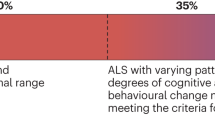Abstract
To define the presence and type of frontotemporal dysfunction in amyotrophic lateral sclerosis (ALS), different screening tools have been created. Currently, the most used screening tests are the Edinburgh cognitive and behavioural ALS screen (ECAS) and the ALS cognitive behavioural screen (ALS-CBS). The objective of this study was to compare the ability of ECAS and ALS-CBS in classifying non-demented ALS patients according to Strong criteria. One-hundred and fifty-four in- and out-patients with an age > 18 and a definite or probable ALS diagnosis were recruited between September 2019 and February 2020 at NeMO Clinical Centre and at Istituto Auxologico Italiano in Milan and underwent the Edinburgh Cognitive and Behavioural ALS Screen (ECAS) and the ALS Cognitive Behavioural Screen (ALS-CBS). Exclusion criteria involved patients with a diagnosis of FTD, with a severe cognitive deterioration and/or an important behavioural impairment, with a significant psychiatric disorder or with the co-presence of another significant illness. The distribution of patients according to Strong criteria was different for ECAS and ALS-CBS and the degree of agreement between the two tests in terms of Cohen’s Kappa coefficient resulted equal to 0.2047 with a 95% confidence limits interval between 0.1122 and 0.2973. This study for the first time compares the ability of ECAS and ALS-CBS in stratifying ALS patients. Further studies will be conducted to better understand the reasons underlying the differences between these two tests in classifying the different subtypes of fronto-temporal dysfunction in ALS.


Similar content being viewed by others
Availability of data and materials
Data are available upon reasonable request. De-identified database will be shared upon reasonable request for 2 years after publication by contacting the corresponding author at the following e-mail: christian.lunetta@centrocliniconemo.it.
Code availability
The datasets generated and analyzed during the current study are available from the corresponding author on reasonable request.
References
Salameh SJ, Brown RH, Berry JD (2015) Amyotrophic lateral sclerosis: a review. Semin Neurol 35(4):469–476
Strong MJ, Grace GM, Freedman M et al (2009) Consensus criteria for the diagnosis of frontotemporal cognitive and behavioural syndromes in amyotrophic lateral sclerosis. Amyotroph Lateral Scler 10(3):131–146
Strong MJ, Abrahams S, Goldstein LH et al (2017) Amyotrophic lateral sclerosis - frontotemporal spectrum disorder (ALS-FTSD): revised diagnostic criteria. Amyotroph Lateral Scler Frontotemporal Degener 18(3–4):153–174
Rascovsky K, Hodges JR, Knopman D et al (2011) Sensitivity of revised diagnostic criteria for the behavioural variant of frontotemporal dementia. Brain 134(9):2456–2477
Niven E, Newton J, Foley J et al (2015) Validation of the edinburgh cognitive and behavioural amyotrophic lateral sclerosis screen (ECAS): a cognitive tool for motor disorders. Amyotroph Lateral Scler Frontotemporal Degener 16(3–4):172–179
Woolley SC, York MK, Moore DH et al (2010) Detecting frontotemporal dysfunction in ALS: utility of the ALS cognitive behavioral screen (ALS-CBSTM). Amyotroph Lateral Scler 11(3):303–311
Poletti B, Solca F, Carelli L et al (2016) The validation of the Italian Edinburgh cognitive and behavioural ALS screen (ECAS). Amyotroph Lateral Scler Frontotemporal Degener 17(7–8):489–498
Tremolizzo L, Lizio A, Santangelo G et al (2020) ALS cognitive behavioral screen (ALS-CBS): normative values for the Italian population and clinical usability. Neurol Sci 41(4):835–841
Hodges JR, Miller B (2001) The classification, genetics and neuropathology of frontotemporal dementia. Neurocase 7:31–35
Neary D, Snowden JS, Gustafson L et al (1998) Frontotemporal lobar degeneration. A consensus on clinical diagnostic criteria. Neurology 51:1546–1554
Brooks BR (1994) El escorial world federation of neurology criteria for the diagnosis of amyotrophic lateral sclerosis. subcommittee on motor neuron diseases/amyotrophic lateral sclerosis of the world federation of neurology research group on neuromuscular diseases and the el escorial ‘clinical limits of amyotrophic lateral sclerosis’ workshop contributors. J Neurol Sci 124:96–107
McHugh ML (2012) Interrater reliability: the kappa statistic. Biochem Med 22(3):276–282
Acknowledgements
We are grateful to all patients and caregivers that collaborated to the study.
Funding
This study received no funding.
Author information
Authors and Affiliations
Contributions
CL and BP had full access to all of the data in the study and takes responsibility for the integrity of the data and the accuracy of the data analysis. Study concept and design: CL, BP, LCG, and AL. Acquisition, analysis, or interpretation of data: LCG, ST, AL, FS, BP, and CL. Drafting of the manuscript: LCG and AL. Critical revision of the manuscript for important intellectual content: all authors. Statistical analysis: AL. Study supervision: CL and BP.
Corresponding author
Ethics declarations
Conflicts of interest
CL received compensation for occasional scientific consulting from Neuraltus, Cytokinetics, Mitsubishi Tanabe Pharma Europe and Italfarmaco and has received funds from ARISLA and Italian Ministry of Health, AL received compensation for occasional scientific consulting from Italfarmaco, VAS participates in Advisory Boards or Teaching activities for Biogen, Roche, Avexis, PTC, Santhera, and Sarepta, Dyne. Other authors declared no disclosures.
Ethics approval
The study design was approved by the institutional ethical committees of Milano Area 3 and all the subjects involved signed the informed consent in accordance with the ethical standards laid down in the 1964 Declaration of Helsinki and its later amendments.
Consent to participate
All the subjects involved in the study participated willingly.
Consent for publication
All the subjects involved signed the informed consent for publication data.
Rights and permissions
About this article
Cite this article
Greco, L.C., Lizio, A., Casiraghi, J. et al. A preliminary comparison between ECAS and ALS-CBS in classifying cognitive–behavioural phenotypes in a cohort of non-demented amyotrophic lateral sclerosis patients. J Neurol 269, 1899–1904 (2022). https://doi.org/10.1007/s00415-021-10753-w
Received:
Revised:
Accepted:
Published:
Issue Date:
DOI: https://doi.org/10.1007/s00415-021-10753-w




